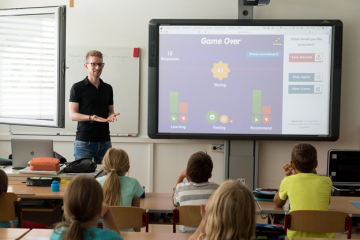Look at the title of this post again. I bet you don’t hear that question often. Most people assume that gifted children do so well in school that there’s really no reason to even ask. While it’s true that academics pose little trouble for those kids identified as “gifted,” that doesn’t mean that school as a whole is a breeze for them.
Believe me, I’m speaking from personal experience here. My son got his “gifted” stamp in 3rd grade. He’s now in 5th (which is middle school in Alabama), and of all of my children, he dislikes school the most. Allow me to illustrate the crux of the problem by sharing a conversation Billy and I had a few nights ago:
 Billy (doing his homework): Hey Mom, I like having someone to talk to while I’m doing my homework.
Billy (doing his homework): Hey Mom, I like having someone to talk to while I’m doing my homework.
Me: Shouldn’t you be concentrating?
Billy: No. I already know all of this stuff.
Me: How do you already know it?
Billy: Because I learned it three years ago!
You see, when Billy learns something, he doesn’t forget it—ever, but this isn’t just a proud mama talking. I think many gifted children soak up knowledge like a sponge and are very good at retaining it. And let’s face it—there’s a lot of remediation that goes on in public schools, especially as standardized test week approaches. Then, it becomes all about bringing everyone up to a certain level with little regard for those who are well beyond it.
But lack of a challenging curriculum isn’t the only hurdle our gifted children face. There’s also the social component to consider. Many gifted children have trouble relating to their same-aged peers because with their precocious vocabulary and mannerisms, they literally speak a different language. That’s why these children often get along well with adults and kids who are older than them.
Then, there’s the trouble with verbal communication. There are so many ideas floating around in these children’s heads that they often can’t get them out fast enough and when they do, it can come out jumbled and awkward sounding. This only contributes to the social problem and can make your child self-conscious as well.
If your child is gifted or demonstrates any of the behaviors above, there are some things you can do to help him out:
- Ask if there’s a gifted program at your child’s school. Even if your child hasn’t been identified as gifted, you can request to have him tested.
- Keep your child’s library stocked with entertaining and challenging books. Most gifted children have an intrinsic love for reading, and there’s really no better way to learn.
- Talk to your child’s classroom teacher and request that he receive enrichment activities to increase the challenge level of the curriculum. Gifted programs are good, but often, they only include a weekly pull-out class, so they’re not replacements for the regular curriculum.
- Arrange for your child to spend time with his peers outside of school to promote social development.
- Seek out other resources and support groups. Talk to parents of other gifted children or join an online forum such as the Davidson Gifted Issues Discussion Forum or Hoagie’s Gifted Education Page to share ideas.
- Consider going to the annual Edufest conference for gifted and talented education.
Most importantly, talk to your child about her differences. Let her know that it’s okay to be different and that being gifted doesn’t make her better or worse than any other child. Explain that we all have unique characteristics and that in order to get along, we have to learn to tolerate these differences. Sometimes, pointing out how others are different as well will help your gifted child feel less like a square peg and more like the uniquely talented flower that she is!



1 Comment
Corin Barsily Goodwin · November 10, 2012 at 9:50 am
There are also plenty of alternative options available these days, including homeschooling (which looks very little like it did just 5-10 years ago!). Often, a gifted child just isn’t going to fit in the classroom. Parents need to make the choice to stick with it or to focus their energies elsewhere – and they need to do it over and over, because kids change, the educational environments available change, etc. It’s a good thing there are so many possibilities! 🙂
Comments are closed.